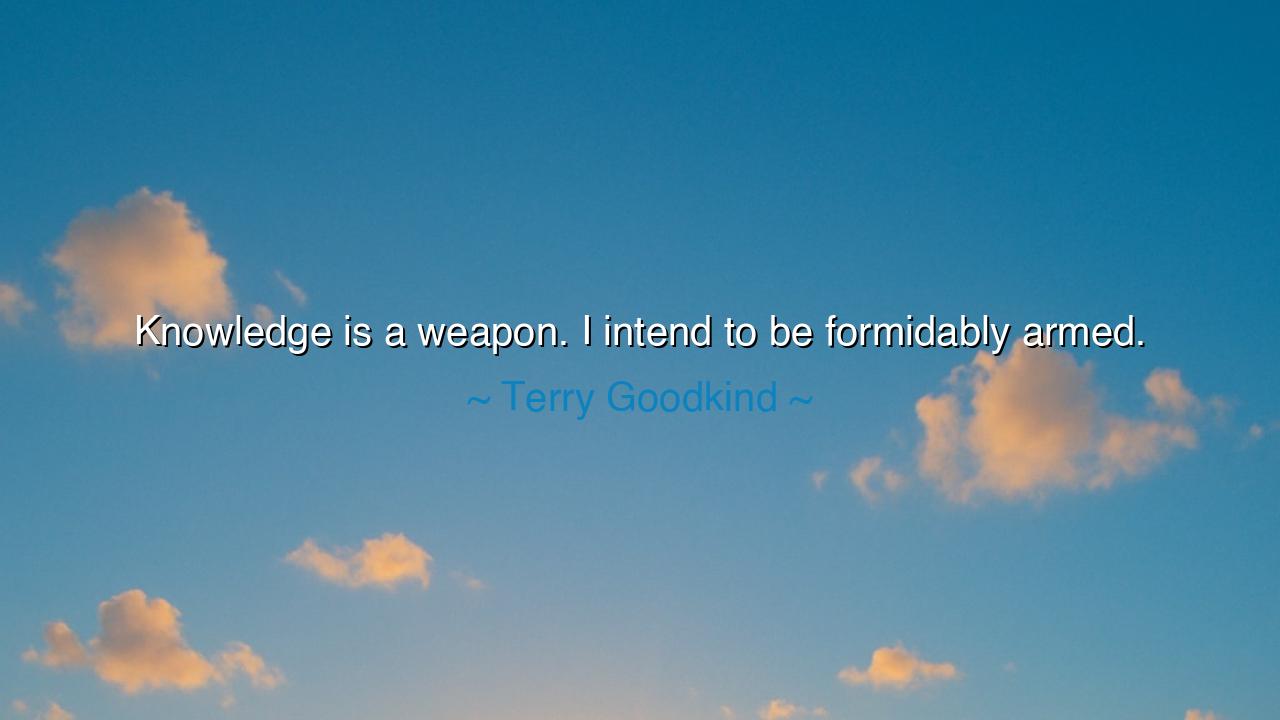
Knowledge is a weapon. I intend to be formidably armed.






“Knowledge is a weapon. I intend to be formidably armed.” — Terry Goodkind
In these fierce and immortal words, Terry Goodkind, the writer of epics and weaver of moral truths, speaks as both warrior and philosopher. His declaration is not of steel or fire, but of the mind—the most potent battlefield of all. For knowledge, unlike the sword, never rusts. It cannot be stolen, it cannot be disarmed, and it grows sharper with every question asked, every truth sought, and every lie unmasked. To be formidably armed is not to carry weapons of destruction, but to carry within oneself the light of understanding, the discipline of reason, and the courage to wield truth in a world clouded by ignorance.
The origin of Goodkind’s words lies in his vision of the hero as a seeker of truth. In his novels, those who triumph are not merely strong of body, but strong of mind. They are guided by insight, by moral conviction, and by the clarity that comes only from knowing—truly knowing—both the world and oneself. Through his characters, Goodkind shows that ignorance is the true enemy, and that knowledge, when honed and tempered, is the greatest weapon of freedom. His words remind us that in every age, from the dawn of civilization to this moment, the mightiest revolutions have begun not with swords, but with ideas.
Indeed, history itself bears witness to this truth. Consider Frederick Douglass, born into the chains of slavery, denied education by those who feared what knowledge could awaken. “If you teach that man to read,” said his master, “he will never be fit to be a slave.” And so it was: Douglass learned to read, and through the power of knowledge, he shattered his mental bondage long before he broke his physical chains. His intellect became his weapon; his words, his sword. With pen and speech, he struck down ignorance and injustice, and his legacy still echoes through the ages as proof that knowledge is freedom, and freedom, once awakened, cannot be silenced.
But Goodkind’s wisdom also carries a warning. A weapon, however noble, must be wielded with purpose. For knowledge without conscience can destroy as easily as it can defend. The same fire that lights the hearth can burn the world if guided by arrogance or greed. The wise must therefore learn not only to seek knowledge, but to temper it with wisdom—to know when to strike and when to stay the hand. The ancients understood this balance well: they taught that the philosopher’s greatest virtue is humility, for only the humble know that all knowledge is but a glimpse of the infinite.
And yet, in every generation, there are those who fear the power of an informed mind. Tyrants and manipulators throughout history have sought to keep the masses uneducated, for they know that the moment a man begins to think, he begins to question. When knowledge spreads among the people, chains begin to break, and empires built on deception tremble. Thus, to be “formidably armed” is an act of defiance—a refusal to remain ignorant, a pledge to rise above the illusions of others. The truly armed mind cannot be conquered, for it fights not with violence, but with truth.
So, what lesson shall we draw from Goodkind’s fire-forged words? That to live honorably in this world, one must never stop learning. Study the sciences, read the philosophers, learn from the failures and triumphs of history. Observe, reflect, question, and refine. Let every experience, every sorrow, every victory become another blade in your arsenal of understanding. For the mind, once awakened, becomes a fortress; and in that fortress, no tyranny can take root.
Therefore, dear seeker of wisdom, arm yourself. Arm yourself not with hate, nor with pride, but with knowledge—the pure, enduring kind that opens hearts and frees spirits. Let your thoughts be your shields and your understanding your blade. Be relentless in your pursuit of truth, and let ignorance flee before you as shadows before the dawn. For the one who is formidably armed with knowledge becomes not only invincible but immortal—leaving behind not wounds, but wisdom; not scars, but light.
And when your life’s battle is done, may others say of you what history has said of all great souls: that you fought not to destroy, but to enlighten—that you proved, in both word and deed, that knowledge is the weapon of the free, and the inheritance of the brave.






AAdministratorAdministrator
Welcome, honored guests. Please leave a comment, we will respond soon